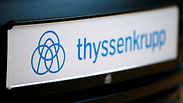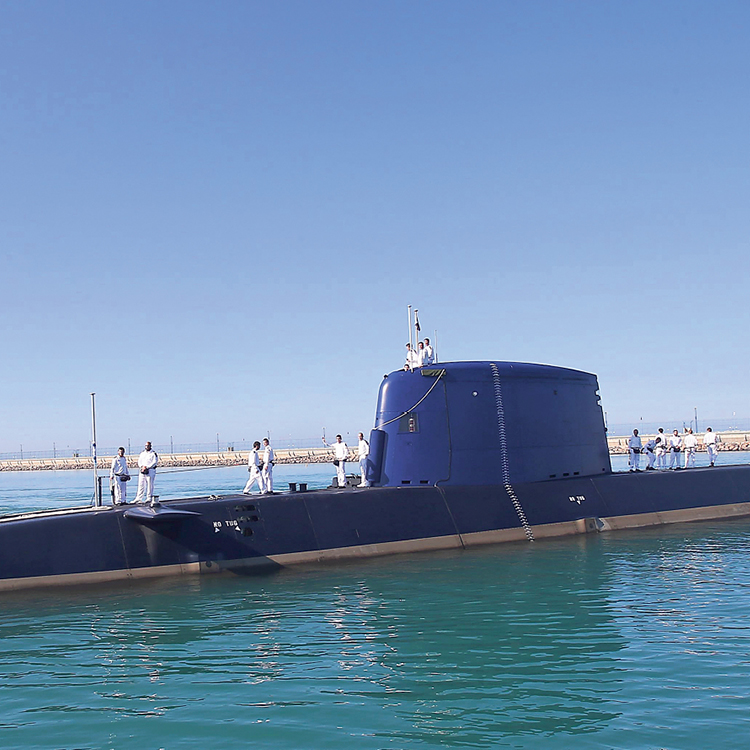
The “submarine affair” is about to be turned into a criminal investigation, and the people involved in it—including attorney David Shimron, who served as a middleman, and former Navy chief Major-General (res.) Eliezer Marom—are expected to be questioned.
We should take a look at the method of work allegedly revealed by the affair in order to understand how tens and hundreds of millions of shekels are spent on annual basis in a way which does not necessarily best serve the interest of the public paying this money.
One might ask what would have happened had the Defense Ministry accepted the request of the group of investors, represented by attorney Shimron, to build a private shipyard in Israel that would be in charge of the maintenance of vessels purchased by the Navy in Germany? After all, what would make more sense than having the German company which builds the vessels come to Israel and replace the Navy shipyards with a private, modern shipyard in German standards, with new infrastructure?
But in order to understand the cynicism and the manipulations of the people involved in the Navy deals, those who seek to cling to the huge udders of the defense budget and enjoy the mountain of public funds, should take a look at the numbers. Needless to say, we are talking about milk-dripping udders that it’s really not that complicated to connect to, as the cow itself doesn’t always know how many calves it is feeding.
Take, for example, the Dolphin-class submarines, which undergo a general renovation at the Navy shipyards once every seven years.
Such a renovation can often last more than a year. This means that if the Navy has five submarines today and will have six submarines in 2020, every year at least one submarine will be in the shipyard for a thorough renovation.
This brings us to the difficult numbers: The cost of renovating a submarine can reach about NIS 100 million (roughly $27 million). After the basic investment and current expenses, each private shipyard has a secure net profit of tens of millions of shekels a year.
When the private shipyard is a monopoly, not only does it secure a fixed profit, but it can also dictate the maintenance costs at any given moment. It has no competitors, and the client—the Defense Ministry and the Navy—depends on its caprices. Not to mention the possibility that the private shipyard will get a franchise for the maintenance of the Navy’s surface combatants, and you have a situation in which its owners hold the State of Israel by its you know what.
The monopoly—or what is known in Defense Ministry lingo as “a sole supplier”—is the original sin in the defense budget. For example, when the Germans producing the Sa’ar 6-class corvette, the missile boat which is supposed to defend the gas fields, realized that the Defense Ministry—with the prime minister’s intervention and his people’s lobbying—was handing them the deal on a silver platter, without a tender, the price of the boats jumped by 25 percent.
When the Defense Ministry insisted on an international bid, the price immediately dropped. This story was not invented by the media. It’s the testimony which former Defense Ministry Director-General Dan Harel gave the police. What pushed Prime Minister Benjamin Netanyahu to get so involved in the two deals? That remains unclear.
One thing is clear: In the Defense Ministry’s purchase deals, there are always suspicions of holes in the pipeline. Tens of millions of shekels, maybe more, fall between two stools. That includes, for example, hiring advisors for the construction of the border fences around the state, payments to external elements in different technological fields, and dozens of projects ordered by the Defense Ministry, which gulp a fortune and leave behind plans that no one intends on implementing, not to mention the investment of billions in the development of systems going nowhere.
The money is being thrown in the garbage, and no one is accountable. Today, for example, the critical issue of replacing the IDF’s cannons is on the table. The need was detected at the beginning of the millennium, the operational demand was issued in 2009, and now they are trying to concoct something new: How to turn the cannons into another “sole supplier” affair.
We are talking about a $1.6-million deal, of which someone will reap the fat benefits at our expense. If they decide to issue a bid after all, the price will drop significantly.
Every month, the Defense Ministry director-general signs a check of NIS 4.5-5 billion for the defense ministry and the IDF’s operation. The daily battle is to ensure that money is not spent on wrong investments, on grandiose projects which have no chance of succeeding, on unnecessary advisors, on inflated delegations, and mainly that the money does not fall into the hands of interested parties.

On Wednesday, it was reported that State Attorney Shai Nitzan is expected to announce in the coming days that the “submarine affair” is about to be reclassified as a criminal investigation. The reason the announcement will be made by Nitzan rather than by Attorney General Avichai Mandelblit is that, at this stage, Prime Minister Netanyahu is not a suspect in the affair and there is no plan to question him.
The submarine affair, which should actually be called “the vessel affair,” focuses on a deal to purchase submarines from German corporation ThyssenKrupp, as well as an attempt to purchase ant-submarine ships and build a private shipyard for the submarines’ maintenance instead of the Navy shipyard—a deal in which Netanyahu’s private lawyer, David Shimron, represented the mediator on behalf of the German corporation, Miki Ganor.
The police have looked into whether the bids were handled properly and whether a bribe was given or taken during the process. Once the examination is officially turned into a criminal investigation, former Navy chief Eliezer Marom will likely be questioned as well, in addition to Shimron and Ganor.
It was further reported on Wednesday that former Navy chief Major-General (res.) Ram Rothberg has already testified the affair.


















